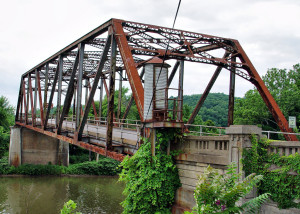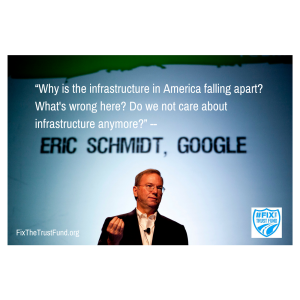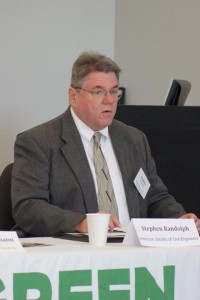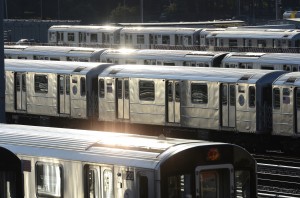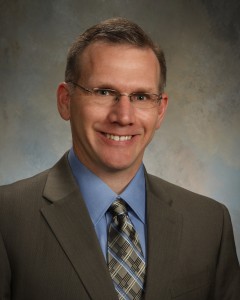Author Archive
This Week in Infrastructure: Infrastructure Won't Fix Itself
February 13th, 2015 | By: Olivia Wolfertz
It is not a news flash that America’s infrastructure needs serious attention and investment. In light of increased attention to our nation’s surface transportation needs, many states are proposing increasing the gas tax to fund transportation. In addition, there has been an uptick in the number of news stories highlighting the need to be more strategic in the way we fund infrastructure. After chunks of concrete fell this week from a bridge on the DC Beltway in Maryland onto a moving vehicle, Manager of Public and Government Affairs at AAA Mid-Atlantic said “this is yet another reminder of why transportation funding in Maryland is so critically needed.” This incident prompted Transportation Secretary Anthony Foxx to underscore the necessity of providing funding to maintain and repair the nation’s bridges. Pennsylvania’s bridges have also received media attention lately, with 22 percent of the state’s bridges classified as structurally deficient, making it the highest percentage in the country. In an effort to fund their aging transportation infrastructure, more and more states are considering gas tax increases. Iowa is proposing a 10-cent gas tax hike that would generate close to $215 million a year for Iowa’s road system. Utah is recommending a bill to raise diesel fuel by 10 cents per gallon for road and bridge maintenance. Georgia is considering a $1 billion transportation funding plan that would steer gasoline tax revenue toward asphalt and concrete repairs. Though increasing state-level gas taxes is a step in the right direction, long-term, sustainable federal funding is critical to restore the nation’s infrastructure, as the states need the federal government to continue being a trusted partner in transportation projects. Transportation Secretary Anthony Foxx told Congress this week that temporary funding patches do not provide enough money for states and local governments to finance “badly needed long-range construction projects,” noting that the Obama administration has proposed a measure to spend $478 billion over the next six years. As states continue to make decisions with limited budgets, one tool that can help them make the most of the investment is life cycle cost analysis. Vox recapped a study by Smart Growth America, reaching similar conclusions to ASCE’s Maximizing the Value of Investment Using Life Cycle Cost Analysis report. Increased investment is essential in maintaining our transportation system in a state of good repair. By using effective planning tools such as life cycle cost analysis coupled with an increased investment, America will be better equipped to modernize its transportation system. Regardless of states’ efforts to fund transportation infrastructure, the Highway Trust Fund is headed towards insolvency in a matter of months. If there is no fix it will be detrimental to every state and our economy It’s imperative that members of Congress work together to pass legislation that will provide a sustainable, long-term funding solution to #Fix-the-Trust Fund.Tags: bridges, gas tax, highway trust fund, infrastructure
1 Comment »
This Week in Infrastructure: Federal Funding Proposals Outline Roadmap for the Future
February 6th, 2015 | By: Olivia Wolfertz
Between the USDOT’s 30-year transportation funding plan, Obama’s 2016 budget featuring the GROW AMERICA act and testimonies of transit needs in the media, our nation’s beleaguered infrastructure is getting some much-needed attention. One blaring example of the our nation’s urban transit needs is evident in James Robertson’s now viral story of walking 21 miles as part of his commute to and from work in Metro Detroit due to lack of transit. While this is an extreme case, Metro Detroit’s transit options have become fewer over the last five years. The Detroit Free Press reported that tens of thousands of Detroit residents have limited or zero access to public transit that meets their core needs, echoing the Report Card’s assessment that 45 percent of households don’t have access to transit. According to the Detroit Free Press, the cascading effect of transit needs is critical as, “cities live and die on their ability to move their citizens around.” In May, Director of Michigan DOT, Kirk Steudle, has the opportunity to begin addressing this need along with the state of the roads by passing Proposition 1 which will remove the sales tax from gas and allow the fuel tax to be raised, in order to provide for transit needs and “stop the decline” of Michigan’s roads. Infrastructure is a problem across the nation. America’s roads are now ranked no. 16 in the world, behind countries such as Oman, the United Arab Emirates and Portugal. The USDOT’s 30 Year Transportation Plan Blue Paper compares our nation’s infrastructure quality, broken down by sector, with that of the world’s. It also projects how failing to invest in our infrastructure, as the country’s population continues to increase, will affect the daily lives of every American. It is startling to think that by 2045 traffic conditions like that in Los Angeles could be the reality of every city. It is clear that transportation issues, whether traffic gridlock, transit shortages or bridge closures, are a direct result of lack of maintenance and funding. Obama’s GROW AMERICA Act, and a $478 billion, six-year surface transportation (MAP-21) re-authorization proposal, are encouraging steps to address this but does not provide the long-term, sustainable funding that our surface transportation system requires.Tags: DOT, highway trust fund, transit
No Comments »
Advocate Profile: Steve Randolph
January 30th, 2015 | By: Olivia Wolfertz
Steve Randolph P.E. is an active member of ASCE’s St. Louis section, where he is currently the section president. He is an Environmental Project Manager at Horner & Shifrin, Inc., a multidisciplinary engineering firm in St. Louis, Mo. As a project manager, he is responsible for planning and executing environmental engineering projects according to schedules and budgets. His specialty areas include storm water management, flood studies, and water distribution. Randolph received his bachelor’s degree in civil engineering from Washington University in St. Louis, and his MBA in finance from Webster University in St. Louis, Mo. If you are interested in becoming involved with ASCE’s Key Contact Program and promoting the profession through advocacy, learn more information and sign up at asce.org/keycontacts. How did you become interested in and get involved in advocacy for your profession? I’ve always had an interest in politics and seriously considered political science as a major in college. Joining the St. Louis Section’s Government Relations Committee seemed a perfect way to meld my interest in politics to my profession of civil engineering. Also, becoming a Key Contact was one of the earliest and easiest ways to get started in this area. What issues have you highlighted/focused on when communicating with your legislators? I’ve pretty much stuck to issues that are in line with the Society’s initiative to raise the grades on America’s infrastructure such as surface transportation, the Highway Trust Fund and the Water Resources Reform and Development Act. In my home state of Missouri, I was involved in our State Infrastructure Report Card and participated in a legislative drive-in where our group lobbied for a bill that would fund transportation infrastructure with three-quarter cent sales tax. I’ve also had a couple of letters to the editor and op-ed pieces published in the St. Louis Post-Dispatch. What levels of government have you focused your efforts on? (Local, state, federal) Is there something that prompted you to focus your efforts there? My efforts have been at state and federal level. That seems to be where most of the funding originates. On the federal level, I’ve participated in three legislative ASCE Fly-Ins and participated in local events by Missouri’s Senators Claire McCaskill and Roy Blunt. I also keep in touch with my Congressman Lacy Clay’s Legislative Counsel, Pauline Jamry. Last November, I represented ASCE at an event called, “Repair America Infrastructure Roundtable.” This was an event sponsored by the BlueGreen Alliance and Repair America to inform the public about the importance of infrastructure investment as it relates to our nation’s economy and job creation. I’m currently working with ASCE’s Government Relations staff to help set up a joint breakfast meeting sponsored by ASCE, the St. Louis Chamber of Commerce and the Associated General Contractors of St. Louis. Building America’s Future is providing former Transportation Secretary Ray LaHood as the keynote speaker. We will present our State Report Card at the event and have a panel of local experts to discuss the importance of infrastructure funding to the local economy. Hopefully it will also promote the proposed three-quarter cent sales tax issue that I mentioned earlier. Do you offer your expertize beyond that of a traditional citizen lobbyist for the public’s benefit (i.e. media interviews)? I did a couple of newspaper interviews when we rolled out the Missouri State Infrastructure Report Card but nothing beyond that. How do you gather information and prepare to do your advocacy work? The issue briefs distributed at the legislative ASCE Fly-Ins are a great source of information as are the weekly “This Week in Washington” email newsletters. The ASCE, Politico and Washington Post websites are also great resources for federal issues. ASCE’s Government Relations Staff in Washington, D.C. is invaluable. Whenever I’ve asked them for help, they are always ready, willing and enthusiastic to assist. On the state and local level, our local newspaper, the St. Louis Post-Dispatch, is my main resource. ASCE’s State Government Relations Staff is top-notch and always eager to help. What have you learned through your activities as an ASCE advocate and citizen lobbyist? I’ve become much more aware of the inextricable link between infrastructure and the economy. You cannot have a thriving economy without first-class infrastructure. I’ve also learned that our legislators want to hear from their constituents. My encounters with my state and federal representatives as well as their staff have always been pleasant and friendly. Has the experience helped you improve skills you utilize personally or professionally? Yes. I believe that I’ve become a more effective communicator, especially in face-to-face meetings. Also, I believe that I’ve become more proficient with time management. Incorporating these volunteer activities with my job and family obligations has forced me to allocate my time more efficiently. What has been challenging about being an advocate? What methods have you found effective in working through those challenges? What sort of pitfalls or setbacks have you encountered? And how did you overcome them? The hardest part is just getting started. You need to fight the urge to sit on the couch and be a spectator. It helps to have colleagues that share your interest because you can encourage one another and provide support. Randy Perkinson of the St. Louis Section was a great mentor on my first legislative ASCE Fly-In. He really helped me navigate my way on Capitol Hill and through the meetings with legislators and staff. The St. Louis Section’s Government Relations Committee also provides leadership and support. Dennis Boll, our Committee Chairperson, is passionate about infrastructure advocacy and his enthusiasm is contagious. Having younger members involved also helps to work through challenges because you assume a mentorship role that keeps you engaged. For example, our legislative drive-in included two of our Section’s younger members, Alison Graves and Kyle Klues. This was their first time meeting with their state legislators and it was a lot of fun guiding them through the experience and providing advice when requested. One setback for the St. Louis Section occurred when one of our U.S. Congressional Representatives (Rep. Russ Carnahan-D) lost his bid for reelection in 2012. We had established a good working relationship with Rep. Carnahan and his local staff and had engaged them in discussions to arrange a series of speaking engagements in the St. Louis area to promote infrastructure investment. Unfortunately, due to redistricting by the state legislature, Rep. Carnahan’s district was redrawn so that he would have to run against another Democrat (Rep. Lacy Clay) in the primary and Rep. Carnahan was defeated. Our plans grinded to a stop and we have yet to get them rolling again. We’ve made some overtures to Rep. Clay’s office but have yet to create the same working relationship with Mr. Clay that we had with Mr. Carnahan. We’re considering changing our strategy with Representative Clay to try and engage him on Science, Technology, Engineering and Math (STEM) issues rather than infrastructure. Indications from his staff indicate that STEM is a topic on which he may be more interested. What have you found rewarding about your efforts? Have you felt that your efforts have made a difference? How? Is there a particularly memorable experience you can share? My advocacy efforts are rewarding to me because I do think they make a difference. I think it’s easy to sit back and criticize our politicians and the legislative process but I don’t think that’s a very effective way to promote change. I’ve found that the idea of infrastructure investment has bipartisan support but that both sides don’t always agree on how to fund the investment. I think it helps that ASCE supports all manners of investment and is open to a variety of methods including user fees, tolls and public-private partnerships. I think that helps our voices be heard when we talk about infrastructure issues. My most memorable experience was my first legislative ASCE Fly-In (2012). It was my first trip to Washington D.C. and I was excited to finally visit our nation’s capital. That year, on the first day of the ASCE Fly-In, there was an event called “Rally for Roads” taking place on the National Mall. ASCE members that were in D.C. that morning were encouraged to attend. Randy Perkinson and I had an early-morning flight that day and arrived in Washington with just enough time to catch a cab and make it to the rally. Arriving at the National Mall, under the shadow of the Washington Monument and joining the hundreds of people gathered there in support of the transportation bill was invigorating. What advice would you give to someone interested in getting involved in advocacy? Jump in, the water’s fine. Start with becoming a Key Contact and subscribe to ASCE’s, “This Week in Washington.” Volunteer for your Branch or Section’s Government Relations Committee. I think once you get started, you won’t want to stop.Capitol Hill Buzzing with Infrastructure Funding Proposals
January 23rd, 2015 | By: Olivia Wolfertz
Between President Obama addressing infrastructure needs in his State of the Union Address, the Virginia Report Card release and additional infrastructure funding legislation being proposed at the federal level, ASCE is optimistic that a long-term, sustainable funding solution for our nation’s infrastructure is within grasp. As both parties of Congress struggle to agree on how infrastructure should be funded, our nation’s infrastructure continues to decline. Almost one-third of our roads are in poor or mediocre condition and more than 40 percent of urban highways are congested. One in nine bridges is structurally deficient, and nearly a quarter are functionally obsolete. Restoring our nation’s infrastructure into a good state of repair will require nearly $3.6 trillion in investment by 2020, leaving us $1.6 trillion short based on current funding levels. In his State of the Union address, President Obama declared that Congress needs to pass a bipartisan infrastructure plan that will create more than 30 times as many jobs per year and strengthen the country’s economy. The president also proposed a change in the tax code to encourage the private sector to invest in infrastructure through low-interest municipal bonds. Though President Obama’s push for infrastructure funding through tax reform is encouraging, many believe that our infrastructure funding needs require a different course of action. AAA CEO Robert Darbelnet announced in a statement Tuesday that, “The president’s proposal to leverage corporate tax reform or private investment structures to support transportation funding would provide a welcome shot in the arm for our nation’s infrastructure, but this will not provide a sustainable fix to the looming funding crisis at hand.” In the House of Representatives, Cong. John Delaney and Pennsylvania Rep. Mike Fitzpatrick have co-sponsored The Partnership to Build America Act. This bipartisan act will establish a $50 billion infrastructure fund generated by bond sales which will loan money to state and local governments to repair infrastructure. While these proposals for infrastructure funding are certainly promising, the Highway Trust Fund is headed toward insolvency in a matter of months. It’s critical that members of Congress work together to pass legislation that will provide a sustainable, long-term funding solution to #Fix the Trust Fund before the money runs out.Tags: congress, highway trust fund, infrastructure investment
1 Comment »
Increased Optimism for Infrastructure Funding Fix
January 16th, 2015 | By: Olivia Wolfertz
With Congress mapping out transportation plans for the upcoming year and the increasing need for infrastructure investment, it is critical that lawmakers work expeditiously and in a bipartisan manner to address our nation’s dire infrastructure needs. ASCE applauds the Obama Administration’s announcement this week on increasing private investment to infrastructure through its Build America Investment Initiative. Transportation Secretary Anthony Foxx revealed that the White House’s 30-Year Transportation Plan will address funding needs in light of the nation’s rapid population growth and aging infrastructure. Fox indicated, “We must make our solutions as big as our problems” and warned that “not having a plan is the same as having a plan to fail.” A recent New York Times article restated the spiral effects of our country’s insufficient road and transit systems. These subpar transit systems cost our country billions in increased delays, extra fuel costs and auto repair bills. Not to mention poor road conditions contribute to about one-third of all traffic fatalities, or about 10,000 deaths a year. With time running out to #FixtheTrustFund, we hope that members of Congress will work together to pass legislation that will provide long-term sustainable funding for America’s surface transportation systems.Tags: congress, highway trust fund, report card
No Comments »
New Year, New Congress, New Hope for Infrastructure Investment
January 9th, 2015 | By: Olivia Wolfertz
It’s a new year, and with a new Congress in session, there is hope that a federal funding solution for infrastructure can soon be reached. Congress has given us reasons to be optimistic, with more bipartisan support for infrastructure funding buzzing at the federal level. Upon reflecting on the past year’s infrastructure challenges, ranging from water main failures to increased highway congestion and a renewed focus on bridge disrepair, many lawmakers from both political parties are pressing for funding solutions which no longer rule out a possible gas tax increase. Senate Republican Environment and Public Works Chairman James Inhofe indicated more open mindedness toward raising the federal gas tax to solve our transportation infrastructure deficit. Inhofe said that “everything is on the table,” and that his top priority is passing a long-term transportation bill. Senator John Thune (R-S.D.) also agreed that Republicans should leave the door open for a gas tax increase, but defended it as a “user fee,” which ensures each driver pays his or her fair share. In addition to discussing a gas tax increase, legislators are carefully considering other options to fund infrastructure. Senator Bernie Sanders (I-Vt.) plans to introduce a bill in the new session of Congress to “authorize $1 trillion in spending over several years to rebuild the nation’s roads and bridges and invest in other infrastructure modernization projects.” Speaker of the House John Boehner noted that figuring out how to fund the highway bill is an important priority for this year. State governments are also starting the new year with plans to fund infrastructure. Virginia, Pennsylvania and North Carolina have all recently increased their state gas taxes to help fund state transportation projects. In Minnesota, Sen. Amy Klobuchar plans to work across party lines to help pass a long-term transportation bill that will fund projects in her state. While state-level funding efforts are worthwhile, in order to meet the necessary infrastructure investment needs, we need a long-term, sustainable federal funding solution. Hopefully Congress can compromise on a funding solution before the Highway Trust Fund goes insolvent again in May.Tags: bipartisainship, congress, gas tax, highway trust fund, infrastructure report card
1 Comment »
This Week in Infrastructure: The Cascading Effect of Aging Infrastructure
December 19th, 2014 | By: Olivia Wolfertz
As the weather changes and our infrastructure continues to be neglected, issues and disruptions are increasing. Infrastructure collapses, like the water main break in DC, remind us that failing infrastructure is fragile and unpredictable—and should be continuously maintained to help prevent a crisis. On Tuesday in Washington, D.C., a 12-inch water main ruptured below ground, flooding three subway lines and damaging the streets above it. According to DC Water, the pipe was 61 years old, a relatively young pipe among a system with a median age of 79 years. Some pipes in the system even date back to the Civil War era. DC’s drinking water infrastructure requires $1.6 billion in upgrades over the next 20 years and the sewer system needs $2.5 billion in fixes. There are 240,000 water main breaks per year and one every two minutes in the United States because of aging pipes. The DC water main break, which affected both the metro rails and streets above, shows the domino effect of one piece of infrastructure’s impact on others. DC is not the only place where aging infrastructure has shouted for investments. This week, the Nevada Section of ASCE released its state Report Card, where the overall grade was a C-. The report points to the state’s great transportation and infrastructure needs to be discussed in next year’s legislation session. In an op-ed piece from Vermont, the author called for stronger dam legislation, citing the Report Card for Vermont’s Infrastructure’s data. Due to increasing visible need for infrastructure repair, more and more states are taking action to fund infrastructure projects through various measures. In Washington, Gov. Jay Inslee unveiled a 12-year, $12 billion transportation proposal, which would be paid for with fees and a new carbon pollution charge. States like Michigan, Tennessee and North Carolina are also pushing for transportation funding at the state level. Though action on the state level to increase infrastructure funds is encouraging, the best thing for our nation and our economy is to fix the Highway Trust Fund and increase the national gas tax to match inflation.Tags: dams, highway trust fund, infrastructure, infrastructure report card, state report cards, water, water infrastructure
No Comments »
This Week in Infrastructure: All the Reasons to Fix the Trust Fund
December 12th, 2014 | By: Olivia Wolfertz
Reports on transportation investment and its overall benefits to the economy provide incentive for Congress to #FixTheTrustFund as state lawmakers make their own push for infrastructure investment. On Tuesday, the American Association of State Highway and Transportation Officials (AASHTO) and the American Public Transportation Association (APTA) released the 2015 Bottom Line Report, which thoroughly evaluated our nation’s transportation investment needs in relation to our overall economy. According to the report, an estimated $163 billion annually over a six-year period is needed to fix our aging surface transportation. Currently only $83 billion is invested in roads and bridges and only $17.2 billion is invested in public transit. These dramatic investment discrepancies underscore the need for immediate action. Not only does investing in our public transportation benefit those who use it, but such investment also supports our economy by creating jobs. The study from the Transportation Construction Coalition, “Approximately 62 percent of the jobs created from federal highway and mass transit investment are outside the construction industry—service industries such as business, education, health.” Likewise, “every $1 in federal highway and mass transit investment increases the nation’s GDP between $1.80–$2.00.” As ASCE has been saying for years, investing in federal highway and mass transit will reap benefits beyond improving our daily commutes. A recent article in online publication, Mobility Lab, indicated that aging infrastructure also impacts the real-estate market, as road and transit conditions affect where renters and homeowners choose to live. Due to Congress’ lack of progress in fixing the Highway Trust Fund, several states are addressing their infrastructure needs by considering gas tax increases. NPR cited a growing number of Republicans across the country who are realizing that raising the gas tax may be the key to funding infrastructure. In Michigan, Gov. Rick Snyder is calling on lawmakers to double Michigan’s gas tax over time to raise more than $1 billion. Gas tax increases are also on the table for states like Georgia, New Jersey, Utah, South Carolina and South Dakota. With gas prices are at their lowest level in four years, states are motivated to seize this opportunity to raise money while they can. Though action on the state level to increase infrastructure funds is encouraging, the best thing for our nation and our economy is to fix the Highway Trust Fund and increase the national gas tax to match inflation. To learn more about what’s happening in your state and our country, download our newly updated 2013 Infrastructure Report Card app for your Android/iOS Tablet. A smart phone version will be available soon.Tags: gas tax, highway trust fund, infrastructure investment, infrastructure report card
No Comments »
Advocate Profile: Shawn Kelley, Ph.D., P.E., M. ASCE
December 11th, 2014 | By: Olivia Wolfertz
Shawn Kelley Ph.D., P.E., M.ASCE is an active member of the Vermont section. He works as a firm shareholder for GeoDesign, Inc. a consulting firm headquartered in Middlebury, CT, providing geotechnical, construction, and environmental engineering consulting services to the design and construction industry. He works in the Windsor, VT office managing civil engineering projects related to geotechnical engineering. He specializes in earth retention and slope stabilization projects, deep and shallow foundation design, geotechnical instrumentation, and in-situ soil testing. Kelley is currently a Region 1 Governor and the Past-President of the Vermont Section of the American Society of Civil Engineers (ASCE). He serves on the Committee on Education (COE) for ASCE National and previously was a committee member on the Committee on Geographic Units (CGU). He is a member of the intersociety committee on Raise the Bar in Vermont. He is corresponding member on the Raise the Bar committee for ASCE and a corresponding member on Leadership Training committee for ASCE. He is also the Legislative Committee Chairperson for ACEC/VT. Kelley received his bachelor’s degree in civil engineering, master’s degree in geotechnical engineering and Ph.D. in geotechnical engineering from the University of Massachusetts at Amherst. If you are interested in becoming involved with ASCE’s Key Contact Program and promoting the profession through advocacy, learn more information and sign up at asce.org/keycontacts. How did you become interested in and get involved in advocacy for your profession? When I moved to Vermont in 2004, I became actively involved in the Vermont Section of ASCE. I have served on various board-level positions and as president of the Section in 2007-2009. After attending a few workshops for section and branch leaders as well as the president and governors forum, I became aware of ASCE’s government relations department and understood the importance of this advocacy. After attending an ASCE National Fly-In, I became “hooked” by the excitement and exhilaration of seeing the political process in action. I also loved how easy it was to connect with my legislators and their staff. What issues have you highlighted/focused on when communicating with your legislators? Funding for infrastructure is always a highlight. Vermont may be a small state but it has many large infrastructure projects that need federal funding. It is very easy to talk with our VT delegation because they understand the issues and they want to help. The VT Statehouse has an open door policy and any constituent is welcome to come, meet and mingle with their legislator in the hallway. What levels of government have you focused your efforts on? (Local, State, Federal). Is there something that prompted you to focus your efforts there? I wanted to focus on the state level because VT legislators are easily accessible. As I stated, the Vermont Statehouse has an “open door” policy that is informal and welcoming. State legislators are always willing to talk and listen. How do you gather information and prepare to do your advocacy work? I rely on the work that ASCE National has done on the Federal level. On the local level, I track legislative bills that are related to civil engineering using the Vermont legislative bill tracking system that is on the state’s website. I have generated an on-going list of the bills, the sponsors for each bill, and the stage the bill is in within the legislative process. This list shows me where we can provide input to state legislative committees, send emails to state legislators, or contact state agencies to ask how we can help support important bills. What have you learned through your activities as an ASCE advocate and citizen lobbyist? It is a long process and persistence and perseverance is key. The legislative process does not happen overnight and some topics are very controversial. For example, raising the gas tax to fund infrastructure projects is always a heated discussion. Has the experience helped you improve skills you utilize personally or professionally? I believe communicating with legislators in oral and written form has improved my communication skills. What has been challenging about being an advocate? Time management, especially when a bill “gets hot” on the state legislative floor. What methods have you found effective in working through those challenges? I try to maintain a balance between work, volunteering and personal life, which can be difficult. It is definitely a balancing act. What have you found rewarding about your efforts? Meeting new people and developing an extensive network of contacts. Is there a particularly memorable experience you can share? There was a large effort a few years back while I was working with ACEC/VT section in getting the State of Vermont contracting terms for consulting engineers updated. The old terms required consultants to indemnify the state for all acts, errors and omissions. As we know, professional liability insurance for engineers does not cover these types of terms. Through our efforts with the Agency of Administration and working with a local state legislator, we were able to get those terms updated so that only negligent acts, errors and omissions are part of the indemnification clause when contracting with the state on engineering design projects. Have you felt that your efforts have made a difference? How? Yes, especially with updating the indemnification terms in the standard state contract for engineering design services. What advice would you give to someone interested in getting involved in advocacy? Do your best to stay updated on current activities with government. ASCE does a great job with the key contact program and “This Week in Washington,” which provides information on the federal and state levels. The amount of information can be overwhelming because so many issues are being discussed in Congress and within each state’s government, but if you focus on a few select topics, it is more manageable. It is important to be willing to provide support when needed if you are on a government relations committee (sometimes at a moment’s notice, depending on the voting stage of bill).This Week in Infrastructure: Final Push in 2014 for Highway Trust Fund Fix
December 5th, 2014 | By: Olivia Wolfertz
Power failures, drivers frustrated with abysmal road conditions and increased media attention to our nation’s aging infrastructure have rattled Americans and driven more states to pursue raising their gas tax as a way of fixing the Highway Trust Fund. This past Tuesday, a massive power failure left large sections of Detroit in darkness. According to the 2013 Report Card, our energy infrastructure scored a D+, largely due to the fact that the nation’s transmission and distribution systems, including 400,000 miles of electricity lines, have long outlived their life spans and desperately need maintenance. Much of the energy infrastructure dates back to the World War II era and some of it was constructed in the 1880s. According to the Yuma Sun paper, Detroit is in the midst of a $200 million upgrade to the power grid to help modernize it. If it takes $200 million to properly upgrade the power grid to one city, it is going to be a “tremendous undertaking to modernize the nation’s power grid.” ASCE would like to see partnerships at the state, local and federal levels to make these repairs happen. At the federal level some bipartisan cooperation around the gas tax has increased despite Congress being in the lame-duck session. As reported in The Hill, Rep. Tom Petri (R-Wis.) and Rep. Earl Blumenauer (D-Ore.) joined together, standing alongside a life-sized cutout of President Reagan, to reiterate support for the 1982 gas tax and to inspire lawmakers to raise the gas tax before the next Congress. ASCE supports this bipartisan proposal to raise the federal gas tax indexed with inflation and hopes it will continue to gain momentum. Meanwhile, an increase to the gas tax continues to be a topic of conversation. The White House Business Roundtable referenced Andy Herrmann’s interview on 60 Minutes in the context of needing a sustainable funding solution to our nation’s infrastructure as soon as possible. Even President Obama weighed in this week on the state of the nation’s infrastructure when he said, “It makes no sense that we have a first class economy with a second class infrastructure.” In comparison with countries like China, our infrastructure puts us to shame. Congress is running out of time this year to pass meaningful legislation to #FixtheTrustFund. Let’s hope they decide not to once again kick the can down the road and into 2015.Tags: 2013 Report, gas tax, highway trust fund
No Comments »



 */ ?>
*/ ?>




